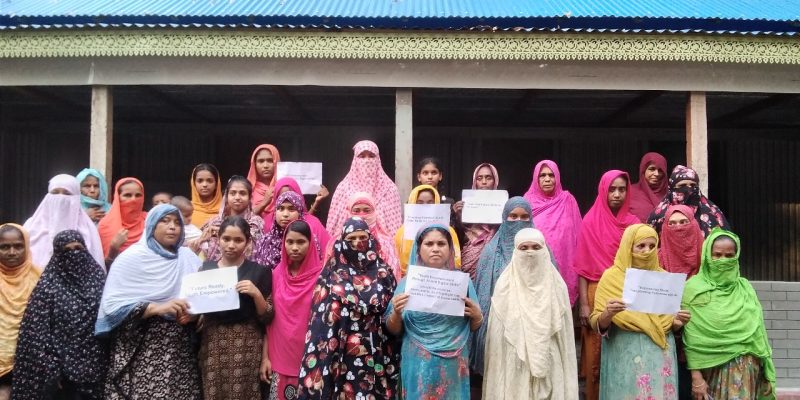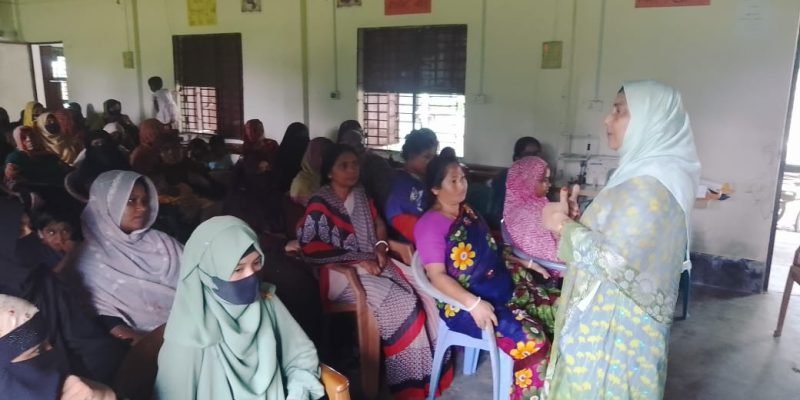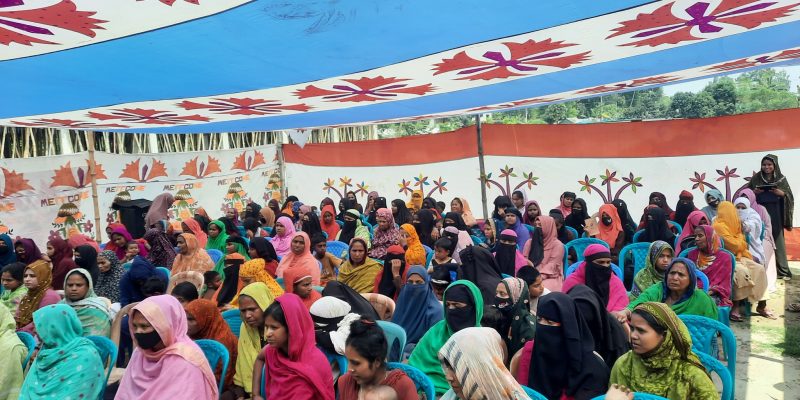Child, Early Forced Marriage (CEFM) (16 April 2016 – 31 December2018)
Preventing Child, Early Forced Marriage (CEFM) through Open and Distance Learning (ODL) & Technology-Based Education with Livelihood Skills and Gender Empowerment of the Adolescent Girls and Women .Funded Commonwealth of Learning (COL)
As part of the initiative, 3,000 poor and disadvantaged adolescent girls and women from rural communities will be sensitized, trained, and empowered through a comprehensive learning program. This program is designed to raise awareness and build essential knowledge on key issues such as the importance of girls’ education, Open and Distance Learning (ODL), child rights, human rights, child early and forced marriage (CEFM), dowry prevention, reproductive health rights, and HIV/AIDS awareness.
In addition to these critical topics, participants will also receive holistic life skills education. This includes training in decision-making, problem-solving, effective communication, social skills, wise use of resources, family planning, leadership, teamwork, self-esteem building, and disease prevention. These skills are essential for enabling young women and girls to take change of their lives, make informed choices, and actively participate in the development of their families and communities.
The program aims not only to improve individual knowledge and confidence, but also to foster long-term behavioral and social change within communities by addressing deeply rooted gender-based challenges and promoting inclusive, rights-based development.
Reaching the Unreached (RTU) Project (18 February 2019-18 February 2021))
Under the CMES RTU Project, implemented in collaboration with the Girls Inspire initiative and supported by the Commonwealth of Learning (COL), 12,000 women and girls from marginalized and disadvantaged rural communities have been equipped with comprehensive skills and life skills training. Funded Commonwealth of Learning (COL)
This initiative has played a vital role in empowering participants with the technical knowledge, self-confidence, and practical capabilities needed to pursue economic independence, enhance their quality of life, and become active contributors to their families and communities. The training covers a range of vocational and entrepreneurial skills, including tailoring, ICT, handicrafts, and small business management, alongside essential life skills such as decision-making, financial literacy, health awareness, communication, and leadership. These integrated learning components are designed not only to support income generation but also to promote personal growth, self-reliance, and social inclusion.
Special focus is given to reaching vulnerable women and adolescent girls, including those at risk of early marriage, school dropouts, and domestic violence. By creating safe, supportive learning environments and offering pathways to education and livelihood opportunities, the project helps break the cycle of poverty and gender-based exclusion.
The RTU Project also engages families and community stakeholders to ensure broader acceptance and sustainability of change. Through community awareness sessions and participatory activities, traditional mindsets are being challenged, and a more enabling environment for women’s empowerment and gender equality is being nurtured.
In summary, the CMES RTU Project is creating meaningful impact by building the capacity, agency, and resilience of thousands of women and girls—helping them shape brighter, more secure futures for themselves and the next generation.
Girls inspire project(GIP) (11 October 2021 -30 June 2023)
The Girls Inspire Project has made a transformative impact by delivering skills and life skills training to 6,000 women and girls from marginalized and underserved communities. These women and girls, many of whom were previously excluded from formal education or economic opportunities, have been empowered to become self-reliant, confident, and active contributors to their families and communities. Funded Girls inspire ,Commonwealth of Learning (COL).
The project focuses on addressing the root causes of poverty and gender inequality by providing participants with practical, market-relevant vocational training alongside critical life skills education. These life skills include communication, leadership, financial literacy, reproductive health awareness, and decision-making abilities—equipping women and girls to navigate challenges in both their personal and professional lives.
A key goal of the Girls Inspire Project is to break intergenerational cycles of poverty and exclusion. By enabling women and girls to access income-generating opportunities, return to education, and engage in their communities, the initiative fosters long-term social and economic change. Many beneficiaries have gone on to start small businesses, re-enter formal schooling, or support their families financially—serving as role models for others in their communities.
In addition to individual empowerment, the project promotes community-wide transformation. It raises awareness about the importance of gender equality, girls’ education, and women’s rights, often engaging families, community leaders, and male allies in the process to ensure lasting impact and cultural shift.
Overall, the Girls Inspire Project represents a powerful model for grassroots empowerment demonstrating how targeted education and skills training can open doors to brighter, more secure futures for women and girls, while also strengthening the resilience and well-being of entire communities.
Empowering Women and Girls (EWG) Project (14 August 2023-30 June 2025)
The “Empowering Women and Girls (EWGS)” project, implemented by the Centre for Mass Education in Science (CMES) is a comprehensive initiative aimed at improving the human rights, health, education and economic empowerment of women and girls in rural areas of Bangladesh. The project is directly providing Skills and life skills training to 10,000 women and girls in underprivileged communities in seven districts. Of which 3% are disabled. Funded Commonwealth of Learning (COL) supported by Global Affairs CANADA.
A key component of the project is the provision of vocational and life skills training, to equip participants with practical skills that enhance their employability, self-confidence and decision-making abilities. These trainings pave the way for economic independence and strengthen the social position of women and girls within their families and communities.
The project, with an emphasis on access to and retention of education, has successfully supported 630 out-of-school children, including disabled children, to reintegrate into the formal or open school system. This not only restores their right to education but also provides them with a second chance to achieve their aspirations.
Takes recognizing the importance of involving all community stakeholders in social change, the EWG project is actively engaging 1,568 men and boys, sensitizing them to gender equality and human rights issues, and encouraging them to collaborate in promoting inclusive and respectful attitudes. In addition, the project is reaching out to 16,667 community members through awareness-raising sessions, dialogues, and community engagement activities aimed at transforming harmful social norms and practices, including child marriage and gender-based violence.
To scale up the impact and ensure widespread accessibility, the project is adopting a mixed learning approach – combining face-to-face training with technology-enabled platforms such as Aptus, Moodle and Mukti. These tools enable flexible, scalable and project-relevant learning in remote areas with limited infrastructure. Overall, the EWG project stands as a model of grassroots empowerment, demonstrating how integrated interventions focused on education, skills development, gender equality and community integration can bring about lasting change for women, girls and their communities in Bangladesh.


